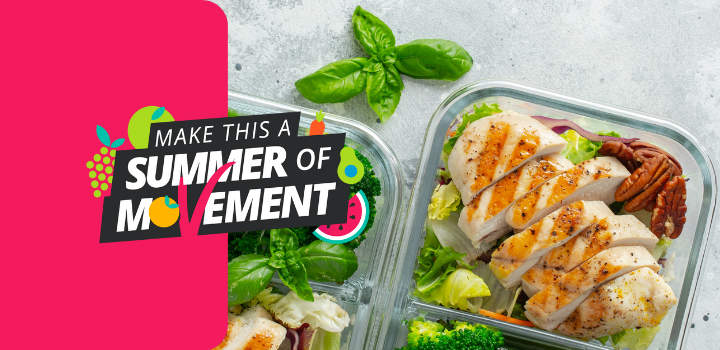
Whether you're aiming to eat cleaner, boost your energy, or just feel great every day - here are tips to get you on track.
What to eat
Choose minimally processed foods - foods as close to their natural state as possible - as these tend to be richer in nutrients. Eat a balanced diet, being sure to include foods from all the food groups.
Your diet should consist of vegetables, fruits, legumes (beans, lentils, chickpeas), whole grains and high fibre starchy foods, dairy, healthy protein rich foods and fats and oils to provide all the nutrients you need as you age:
- Eat plenty of vegetables and fruit: Vegetables and fruit provide many health promoting nutrients and have been shown to reduce the risk of developing chronic diseases. Try to include plenty of different types and colours of fresh vegetables and fruit to benefit from the wide array of phytochemicals (beneficial compounds) found in plant foods.
- Choose whole grains: Opt for whole grains, such as oats, whole wheat bread, whole wheat pasta and brown rice over refined versions like white bread, white pasta and white rice. Refined grains and grain products have less nutrients than their fibre rich alternatives.
- Choose healthy dairy: Calcium is important for bone health. Opt for plain, low fat or fat free milk or yoghurt, or other sources of calcium like canned fish with soft edible bones, calcium fortified milk alternatives such as soy milk, and calcium set tofu. Full cream dairy is higher in saturated fats which guidelines advise to limit for heart health.
- Choose healthy proteins: Proteins are the building blocks for bones, muscles, cartilage, skin and blood. Healthy sources of protein include fish and seafood, in particular omega 3 rich fish such as sardines, pilchards, salmon, trout and mackerel. Skinless chicken, eggs and legumes (beans, chickpeas and lentils) are other healthy choices of protein.
- Choose healthy fats and oils: Sources of healthy fats include olive oil, canola oil, avocado oil, nuts, seeds, avocado, oily fish, as well as nut and seed butters (free of sugar and salt). Opt for unsaturated (mostly plant) fats over saturated (mostly animal) fats. Try to stay away from sources of unhealthy fats like butter, lard, ghee, coconut oil, fat on meat, and chicken skin. Saturated fats increase the risk of heart disease. Oily fish such as mackerel, sardines, pilchards and salmon contain omega 3 fats which help protect against heart disease and cognitive decline.
What to limit
-Limit highly processed foods such as takeaway foods, crisps, chocolate and sweets, cakes, biscuits and pastries, as these foods are often high in sugar and fat (and consequently high in kilojoules which can lead to unhealthy weight gain) as well as high in salt (most of the salt in our diets come from processed foods).
-Avoid processed meats, for example, hot dogs (frankfurters), cold meats such as ham and salami, sausages, corned beef, and biltong as these are often high in salt and are known to increase cancer risk.
Watch your salt intake
The World Health Organization (WHO) recommends salt (sodium) intake should be restricted to less than 5 g of salt (a teaspoon) per day. This is because consuming too much salt leads to high blood pressure which can increase the risk for heart disease and stroke. Try using herbs, salt free spices and a variety of different foods to flavour meals instead of adding salt.
Watch your sugar intake
The WHO recommends that you limit free sugars found in foods like sugary breakfast cereals, biscuits, cake, sugary drinks, sweets and chocolates to less than 5% or at most less than 10% of your total energy intake (6 to 12 teaspoons) a day. This is to decrease the risk of unhealthy weight gain and developing dental caries. Avoid sugary drinks, including fruit juice and always choose water as your beverage of choice when thirsty. Limit the sugar added to tea and coffee.
Eat enough fibre
Fibre is important for digestive health and preventing constipation, a problem many older adults struggle with. Include high fibre foods in your diet. Good sources are plant foods, such as legumes, whole grains, vegetables and fruits.
Drink enough water
Drink water when thirsty and regularly throughout the day. People become more vulnerable to dehydration and feel less thirsty with age. As a guideline, at least 1.5 litres are recommended each day to replace lost fluid. Plain water is the healthiest choice. Remember that you will need to drink more if the weather is hot or humid or if you are physically active.